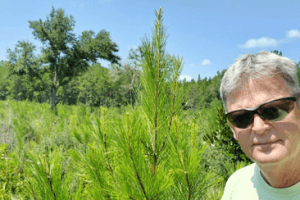February 2022
Rooted in Resilience
Bill Waller, Lynn Haven
Hurricane Michael 2018

On the morning of Oct.10, 2018, Hurricane Michael unleashed its fury on Florida’s Emerald Coast as a devastating, catastrophic storm. With sustained winds of 160 mph, it was the first category 5 hurricane in history to impact Florida’s Panhandle and the first to make landfall in the United States in nearly 30 years.
Florida Farm Bureau member Charles “Bill” Waller recalls spending the day with his family on their boat on Shell Island just three days before Hurricane Michael’s landfall. Weather reports indicated a storm had formed in the Gulf of Mexico and it was expected to intensify into a minor hurricane.
By the next evening, Michael’s trajectory pointed towards his hometown of Lynn Haven in Bay County and evacuation orders were suggested by local government officials. “It all happened so quickly,” he recalled. “The storm intensified rapidly and even though we prayed it would change course, we decided the night before to evacuate to Montgomery, Alabama.”
Waller is a forestry consultant who owns Waller Forestry, Inc., a firm that oversees nearly 50,000 acres of timber in Northwest Florida and Southeast Alabama. His grandfather was in the turpentine business in Youngstown and his family developed their property into a tree farm.
He attended Auburn University where he earned a degree in forestry. Upon graduation, he returned home to Bay County where he worked for many years in the timber and paper industries before launching his own firm in 2016.
“By Wednesday morning (Oct. 10, 2018) we were watching weather reports and hoping for the best,” he said. “We never realized how bad the damages were until we began to receive messages from friends on social media who decided to stay behind, asking for prayers as they watched their windows blow out and trees fall on their roof tops.”
Waller and his family returned home to assess damages two days after Hurricane Michael’s historic landfall. Revisiting the memory, he recalls being purely amazed at the devastation. “Our family tree farm that I had nurtured and managed my whole life had been completely demolished.
Luckily, our house fared slightly better. We had some screen and porch damage and a small hole in the roof where a limb had fallen that ended up being a $100,000 hole, but other than that, we were lucky,” he said.
Ten thousand of the 50,000 acres of timber property that Waller manages was severely damaged. Another 10,000, he explained, was moderately damaged. “The storm’s eye wall passed directly over our family’s tree farm and it seems like anything within a 10-50 mile radius of the eye wall was completely catastrophic,” he stated.
After several days of processing the event, local producers and landowners knew that the recovery and replanting process had no time to wait. The woods were wet, much more than normal, and compounding the trees that had fallen, had disturbed the natural flow of the woodland creeks.
The fallen trees were no longer able to soak up groundwater through their root systems, adding to the dampness. The mess was overwhelming. “Sometimes you just have to play the cards that are dealt to you and get through adversity,” he said. “Once a catastrophe hits, you can’t go back and undo it, you just make the best you can out of it and move forward.”
Waller explained that logging costs skyrocketed and it was difficult for loggers to pick up small pieces (one at a time) on wet ground. Local mills dropped their prices due to the surplus of wood available and producers and landowners salvaged what they could.
“If you had big timber on dry ground, you could more than likely salvage it,” he stated. “If you had small timber on wet ground, things were more difficult.” He explained that most people were able to save 15-20% of the value of their timber, however, there were some local residents who had their entire life’s savings of timber on wet ground, everything lost.
A year and a half after Hurricane Michael’s landfall, Waller was able to reforest areas that had been salvaged. Many foresters, including many of his clients, were not able to reforest additional areas due to lack of funds, including his own family tree farm.
Fortunately, nearly two years after Hurricane Michael’s landfall, the federal government announced the launch of a $380 million grant program to assist farmers and forest landowners affected by the devastating storm. “This grant was unprecedented help to timber producers that were victims of Hurricane Michael,” Waller said.
The government reimbursed producers up to 50% of their timber’s value before the storm. The funds have enabled Waller and many others to repair, reforest, and recover. Even today, nearly three and half years later, Waller’s clients have about 60% of their acreage replanted or it is being replanted every day.
“Seeing young trees growing where devastation once stood is good for the soul,” he said. Everyone in this neighborhood and this part of the state is in the same boat. This impacted thousands, you know you aren’t alone and everyone’s going through the same thing. Whenever you have a gathering, you end up telling your story of the hurricane. It will be with us our whole lives.”
Bill Waller is a Bay County native and a longstanding Florida Farm Bureau member. He serves on the Bay County Farm Bureau Board of Directors as Vice-Chair and is a member of the Florida Farm Bureau’s Forestry Advisory Committee. He and his wife, Selina, have been married for 37 years. They have two adult children – Karen and Lee.

